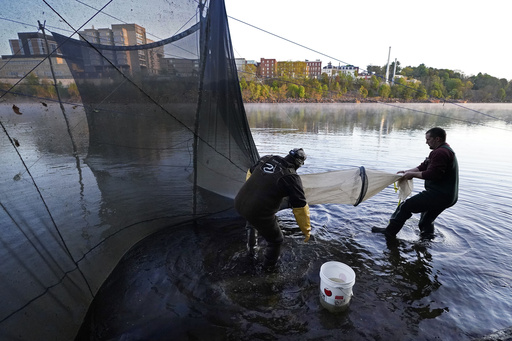
Darrell Young and his son, Dustin, set up a fyke net to capture baby eels migrating upstream on the Penobscot River in Brewer, Maine, May 15, 2021. Fishermen who harvest one of the most valuable marine species in the country hoped to see a bump in quota in 2025, but regulators said Monday, Feb. 5, 2024, the tight restrictions on the baby eel fishery are likely to stay the same. AP FILE PHOTO
PORTLAND, Maine — Fishermen who harvest one of the most valuable marine species in the US hoped for permission to catch more baby eels next year, but regulators said Monday the tight restrictions that have been in place for several years are likely to stay the same.
The tiny baby eels, which are often worth more than $2,000 per pound, are also called elvers. They are a critically important link in the worldwide supply chain for Japanese food. They are harvested from rivers and streams in Maine, sold to aquaculture companies and raised to maturity, then resold as food.
The Atlantic States Marine Fisheries Commission needs to set a new quota for next year and beyond because the current management plan is expiring. The commission said Monday it’s only considering one option for next year’s limit and that is a little less than 10,000 pounds (4,535 kilograms), the same the level fishermen have been allowed to catch for several years.
READ: Hong Kong-bound baby eels intercepted
The commission is under pressure from fishermen who want the quota raised and from environmentalists who would like to see it reduced.
Fishermen who have advocated for removing dams are good stewards of the elvers, said Darrell Young, president of the Maine Elver Fishermen’s Association. Many fishermen run through their quota in just a few days, he said.
Baby eels swim in a tank after being caught in the Penobscot River in Brewer, Maine, May 15, 2021. Fishermen who harvest one of the most valuable marine species in the country hoped to see a bump in quota in 2025, but regulators said Monday, Feb. 5, 2024, the tight restrictions on the baby eel fishery are likely to stay the same. AP FILE PHOTO
“That tells you how thick the eels are. Overabundant,” Young said. “That will give us a good leg to stand on to get more quota.”
The commission’s eel management board also still needs to decide the number of years the new quota levels would remain in place, it said in a statement. The board will hold a public hearing about the matter on Feb. 29, it said.
READ: Fishermen ask government to lift ban on catching young eels
Over the years, members of the Atlantic States commission and other regulators have voiced concern about the decline of worldwide eel populations and the threat of poaching. Maine regulators have responded by implementing new controls to deter illegal fishing.
The eel fishing season happens every spring and Maine is the only U.S. state with a significant, legal fishery for elvers. Last year’s harvest was worth about $2,031 per pound, orders of magnitude more than lobsters or scallops.